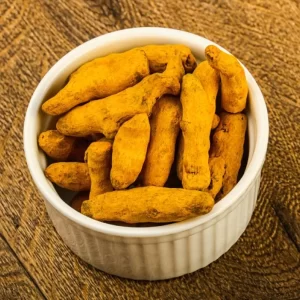
Turmeric is renowned for its vivid yellow-orange color, which comes from its active compound curcumin. It has a warm, slightly bitter taste and is commonly used as a spice in cooking, especially in Indian cuisine. Turmeric has been used for centuries in traditional medicine, particularly in Ayurveda.
Turmeric is a versatile spice used in a variety of dishes, including curries, soups, stews, and rice dishes. It can be used fresh, dried, or ground into a powder. Turmeric holds cultural significance in many regions, often used in religious ceremonies, rituals, and traditional festivals.
Anti-inflammatory Effects:
Curcumin has been shown to help combat inflammation in the body, which is implicated in many chronic diseases, including diabetes.
Blood Sugar Regulation:
Studies suggest that curcumin may help regulate blood sugar levels, which could be beneficial for preventing or managing type 2 diabetes. Research has shown promising results in both animal and human studies, but more research is needed to fully understand its effects.
Antioxidant Activity:
Curcumin’s antioxidant properties enable it to neutralize free radicals, which are harmful molecules that contribute to oxidative damage in the body. This antioxidative action may play a role in combating aging and various diseases.
Combat Viruses
Curcumin has the potential to combat viruses such as herpes and flu.
